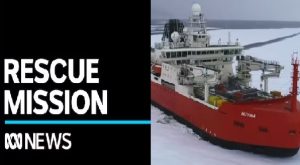05-09-2023
HOBART: Australia has successfully evacuated a sick Antarctic researcher from a remote outpost on the icy continent.
 An urgent rescue operation was launched last week to reach the man, who has an undisclosed “developing medical condition”.
An urgent rescue operation was launched last week to reach the man, who has an undisclosed “developing medical condition”.
The mission required a medical retrieval team, a massive icebreaker ship and two helicopters.
The man is now in route to Tasmania, where he will receive specialist assessment and care.
In an update on Monday, the Australian Antarctic Program (AAP) said the man had been flown to its icebreaker, RSV Nuyina.
The ship had travelled more than 3,000km (1,860 miles) to reach him. On Sunday, it was deemed close enough to the Casey research station for two helicopters – with a medical retrieval team onboard – to deploy.
Medical facilities are limited on the research station, and only about 20 people live there during winter when conditions are at their worst.
With the first stage of the rescue mission complete, the ship is expected to arrive back in the city of Hobart next week.
 “The expeditioner will be looked after in the Nuyina’s specially equipped and designed medical facility by our polar medicine doctors and Royal Hobart Hospital medical staff,” said AAP’s Robb Clifton.
“The expeditioner will be looked after in the Nuyina’s specially equipped and designed medical facility by our polar medicine doctors and Royal Hobart Hospital medical staff,” said AAP’s Robb Clifton.
“Getting this expeditioner back to Tasmania for the specialist medical care required is our priority.”
The expeditioner’s family is being kept fully informed of the situation, the AAP added, and all other personnel on stations are accounted for and safe.
Australia requires all researchers sent to Antarctica to undergo lengthy medical examinations before deployment.
Evacuations from one of the most inhospitable areas of the planet are often complex, expensive, ‘fraught’ with danger and can require assistance from international partners.
It is understood that an evacuation by air in this case was not possible, the nearby Wilkins aerodrome near Casey has an ice runway and is often unusable during the harsh winter.
According to reports the runway would need weeks of preparation to use, and therefore it is far quicker to send the icebreaker. (Int’l Monitoring Desk)
 Pressmediaofindia
Pressmediaofindia




